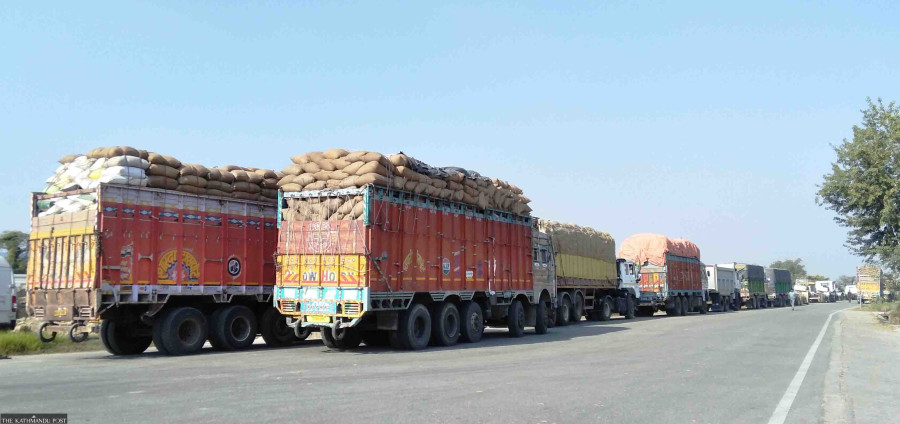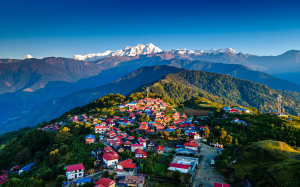Money
Bara-Parsa traders complain of tax overburden
A truck transporting cargo from Birgunj to Pathlaiya has to pay at least Rs2,400 in assorted local taxes, traders say.
Bhusan Yadav
Factories located in the Birgunj-Pathlaiya industrial corridor say they are being overburdened by the myriad taxes charged by various local governments.
The manufacturing hub in Nepal's central Tarai contains more than 1,000 factories and businesses.
Traders say a truck transporting cargo from Birgunj Customs to Pathlaiya has to pay a minimum of Rs2,400 in assorted taxes by the time it reaches the end of its journey.
The vehicle has to pass through Birgunj Metropolitan City, Parwanipur Rural Municipality and Jitpur Simra Sub-Metropolitan City en route to its destination, and each of them collect taxes.
The taxes are collected by contractors of the local governments. The truck drivers complain that employees of the contractor beat and abuse them if they object to the taxes.
Around 300 cargo vehicles bearing Indian licence plates arrive daily at the two customs points in Birgunj on Nepal's southern border—Integrated Check Post (ICP) and Sirsiya Dry Port.
Last Monday, truck drivers stopped their vehicles on the ICP-Bahuari road section to protest against the arbitrary collection of taxes.
The drivers ended their protest after the Superintendent of Police of Parsa Komal Shah assured them that action would be taken against the illegal tax collectors.
According to the police, the people charging money from the truckers had fled by the time they got to Gandak Chowk in Jagarnathpur.
Trucker Santosh Sah said he was forced to pay IRs1,500 to different collectors between Birgunj Customs and Pathlaiya while loading and unloading goods.
Birgunj Metropolitan City has contracted a private firm to collect scrap tax and vehicle tax for the current fiscal year.
Jitpur Simra Sub-Metropolitan City has awarded a contract to another company to collect scrap tax, and road and vehicle taxes.
Parwanipur Rural Municipality has also been collecting scrap tax through private contractors.
Freight carriers and empty vehicles also have to pay taxes to the contractors.
"They charge IRs300 from each empty vehicle,” said truck driver Direndra Das. "If we don't pay the taxes, they stop the vehicle, abuse us and also hit us with sticks.”
The contractors collect the taxes in Indian currency, he said.
Many drivers say they have filed several complaints with the authorities concerned, but no one listens to them.
Rajesh Lama of Kapur Diesel Logistics said the contractors forcibly collect scrap tax from vehicles carrying chips, TVs, refrigerators and motor parts at Gandak Chowk, Jagarnathpur.
“We have filed a complaint at the police administration,” he said.
The traders estimate that around Rs600,000 is being collected daily in illegal taxes.
"One vehicle has to pay scrap tax to three contractors separately,” said Lama. "Even when the municipalities collect taxes from empty vehicles, no action is taken,” he said.
The local governments charge taxes on medicinal herbs, scrap and livestock.
As per the rules, taxes are imposed on 23 items such as medicinal herbs, glass waste, scrap metal, tyre tubes, jute, plastics, leather and paper items. The local governments say they are free to tax any item.
Lama said it was ridiculous to collect taxes from empty container trucks.
“We have informed the authorities, with proof of the unlawful taxes, but no action has been initiated against the tax collectors,” said Lama.
Manoj Karna, chief of Birgunj Metropolitan City’s revenue department, says it is illegal to collect taxes in contravention of the agreement signed between the metropolitan city and the contractors.
“We have been receiving complaints regarding the illegal taxes being collected by the contractors. We will take action soon,” said Karna.
Local traders say they have heard such false promises many times before.
Superintendent of Police Shah said they would take action against illegal tax collection as soon as they receive complaints.
Hari Gautam, senior vice-president of the Birgunj Chamber of Commerce and Industry, says the local government has imposed scrap taxes unlawfully.
He said the local government had altered the definition of scrap to increase its tax revenue.
“This is not justifiable,” said Gautam. “If the local governments don’t correct their decision, we will knock on the court’s door.”
According to the Department of Customs, nearly half of Nepal's imports in the last fiscal year passed through the ICP and Sirsiya Dry Port in Birgunj.
These two transit points on the border with India also accounted for 27 percent of Nepal’s entire exports.




 20.16°C Kathmandu
20.16°C Kathmandu














